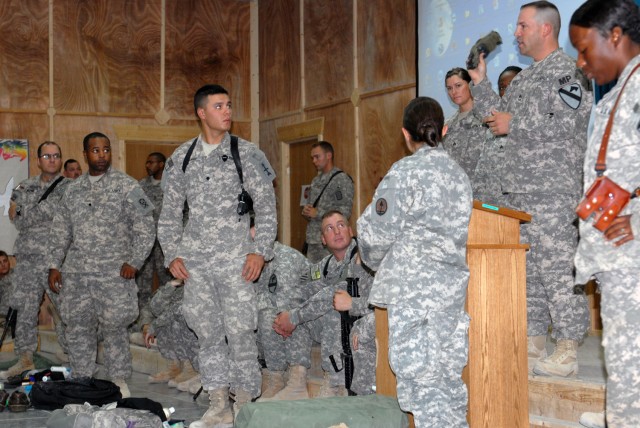
BAGHDAD - Soldiers from all over Iraq gathered at Hope Chapel on Camp Victory, here, to attend a two-day class to certify as custom border clearance agents.
The class is intended to help streamline the transition of units out of country, according to Sgt. 1st Class Travis Huggard, from Kodiak Island, Alaska, assigned to Company A, Division Special Troops Battalion, 1st Cavalry Div.
"Their main purpose when they leave here is to conduct custom clearance of personal gear that is going in containers, military equipment, rolling stock and anything that has to do with customs in the unit," he said. "They're supposed to be subject matter experts when it comes to customs."
"We trained more than 300 people, this class here was totally filled up," said Huggard. "I think this chapel has 300 seats and every seat was full, and that's units from everywhere: north, south, east and west that came here to train for two days."
The large amount of students is due to the need for more customs inspectors, Huggard explained.
"The problem is we don't have enough agents certified in theater to conduct inspections. This class will hopefully fix that problem and give the units enough inspectors within the brigades or the separate units to make a seamless transition out of here," he said. "If you don't have very many inspectors, it's a long day for them out there."
A high turnout is also a result of the scarcity of a customs class for Soldiers in Iraq, Huggard added. This is due to the necessity of having a customs official from the U.S. brought in to conduct the training.
"There's no train-the-trainer program. You can't just send a sergeant first class or an officer to Kuwait to get training and come back here, it doesn't happen like that," he said. "The training usually only happens maybe once or twice a year."
Students learned what to look for when inspecting containers, equipment and vehicles. They became familiar with restricted and prohibited items according to current Department of Defense regulations. Instructors taught them the importance of eliminating biological threats to the U.S. in the form of soil, plants and animals in accordance with the U.S. Department of Agriculture. They were also schooled in the process of performing customs checks for outgoing units.
For Sgt. 1st Class Veral Sullivan, from Sugarland, Texas, assigned to Co. B, DSTB, 1st Cav. Div., the training is invaluable to the Soldiers who took part and the units they return to.
"I think it's going to speed up the process of us going home," he said. "We are going to be able to handle this part of the process ourselves instead of having some civilians come in and do it."
The training is allowing the graduates of the course the ability to speed along the gradual drawdown of U.S. forces in Iraq. Their new knowledge is one more piece of the puzzle falling into place.

Social Sharing